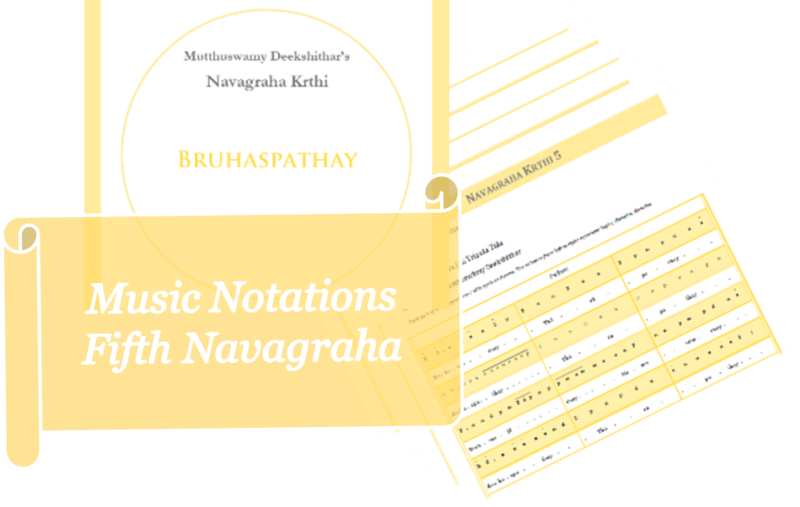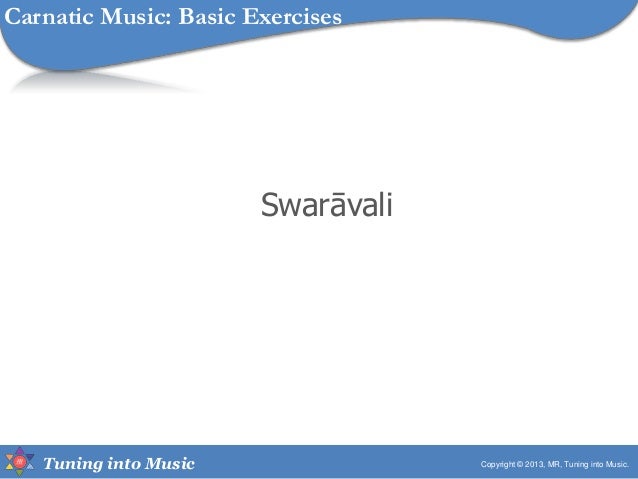Sites to download, listen to music: Carnatic Music Sites. Carnatic music pages: Sabhas Carnatic music groups around the world: The following lists, lyrics and tables will be useful to Carnatic music listeners. The source is given in brackets. Assorted Lyrics Sites. Carnatic Music Notation Typesetter (Arun K) Graphical Tala Generator. Carnatic varnam dataset is a collection of 28 solo vocal recordings, recorded for our research on intonation analysis of Carnatic raagas. The collection has the audio recordings, taala cycle annotations and notations in a machine readable format.
| Arohanam | SR₂M₁PN₂Ṡ |
|---|---|
| Avarohanam | ṠN₂PM₁R₂G₂R₂S |
| Carnatic music |
|---|
| Concepts |
| Compositions |
| Instruments |
|
Shri ragam is an ancient ragam in the Carnatic tradition. It is also written as Sri or Shree.[1] This scale does not have all the seven swaras (musical notes) in the ascending scale.[1]Shree is the asampurna melakartha of Kharaharapriya, the 22nd Melakarta rāgam.[1][2] It is the last of the 5 Ghana rāgams of Carnatic music.[1] It is a pleasing and popular rāgam.[2] It is considered to be highly auspicious.
Notably, Carnatic Shree takes the lower madhyamam being the asampurna scale of Kharaharapriya. It is not related to the Hindustani raga, Shree.

- 3Related rāgams
Structure and Lakshana[edit]
Carnatic Music
Shree is an asymmetric rāgam that does not contain gāndhāram or dhaivatam in the ascending scale. It is a audava-vakra-sampurna rāgam (or owdava, meaning pentatonic in ascending scale),[1] where vakra indicates the zig-zag nature of jumping notes in descending scale. Its ārohaṇa-avarohaṇa structure (ascending and descending scale) is as follows (see swaras in Carnatic music for details on below notation and terms):
- ārohaṇa: SR₂M₁PN₂Ṡ[a]
- avarohaṇa: ṠN₂PM₁R₂G₂R₂S[b] (or) ṠN₂PD₂N₂PM₁R₂G₂R₂S[c]
This scale uses the notes chatushruti rishabham, sadharana gandharam, shuddha madhyamam, panchamam, chatushruti dhaivatam and kaisiki nishadam.
Popular compositions[edit]
Shree rāgam has been decorated with compositions by many composers. A few of the popular kritis are listed here.
- The fifth Pancharatna KritiEndaro mahanubhavulu composed by Tyagaraja in Telugu, the last of the 5 gems
- Sami ninnekori, a Varnam by Karur Devudu Iyer in Telugu
- Nama kumusumamula by Tyagaraja in Telugu
- Yuktamu gAdu by Tyagaraja in Telugu
- Sri Varalakshmi, Sri Muladhara chakra vinayaka , Sri Kamalambike and Sri vishvanatham bhaje by Muthuswami Dikshitar in Sanskrit
- Bhavayami Nanda and Reena Madadritha by Swathi Thirunal
- Karuna Cheyvan Enthu by Irayimman Thampi
- Karuna judu ninnu by Shyama Shastri in Telugu
- Mangalam arul by Papanasam Sivan in Tamil
- Vande Vasudevam by Annamacharya in Sanskrit
- Mayanai part of the Thiruppavai by Andal
Related rāgams[edit]
This section covers the theoretical and scientific aspect of this rāgam.
Scale similarities[edit]
Carnatic Music Songs
- Madhyamavati is a rāgam which has a symmetric ascending and descending scale, which matches the ascending scale of Shree. Its ārohaṇa-avarohaṇa structure is S R2 M1 P N2 S : S N2 P M1 R2 S
- Manirangu is a rāgam which has gāndhāram in the descending scale, while all other notes in both the ascending and descending scale are same as Madhyamavati. Its ārohaṇa-avarohaṇa structure is S R2 M1 P N2 S : S N2 P M1 G2 R2 S
Notes[edit]
- ^Alternate notations:
- ^Alternate notations:
- Hindustani: ṠṈPMRG̱RS
- Western: C B♭ G F D E♭ D C
- ^Alternate notations:
- Hindustani: ṠṈPDṈPMRG̱RS
- Western: C B♭ G A B♭ G F D E♭ D C
Sinhala Music Notations

Music Notations And Symbols
References[edit]
Musical Notations
- ^ abcdeRagas in Carnatic music by Dr. S. Bhagyalekshmy, Pub. 1990, CBH Publications
- ^ abRaganidhi by P. Subba Rao, Pub. 1964, The Music Academy of Madras